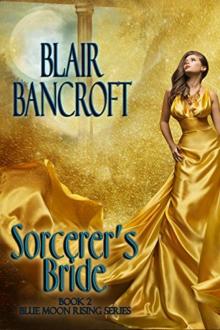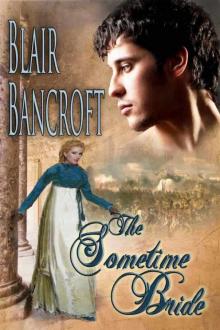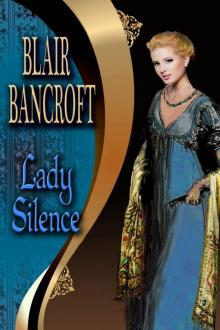- Home
- Blair Bancroft
A Season for Love Page 4
A Season for Love Read online
Page 4
“As to that, I truly doubt I shall be doing so,” Caroline murmured, her wide amber eyes flicking a doubtful glance toward her father.
“Lady Caroline will be living here,” Longville stated firmly. “Lady Eugenia is already aware that I expect her to sponsor Caroline’s come-out,” he added stiffly. “And just what, pray tell, did you expect?” he challenged his daughter. “Had you some notion of living in your cottage until you dwindle to dust? Or perhaps you thought to earn your bread as a governess or companion? Or a life upon the stage? Is that it, Caroline? Pray do not be any more foolish than you have been. I have stood all the nonsense this morning that I can bear.” The Duke of Longville glared at the girl he had thought was his only child. “You will live here and make your come-out. Is that understood?”
Caroline bobbed a curtsy. “Yes, Your Grace.” Inwardly, she seethed.
Tony Norville examined the stormy faces of father and daughter. He shook his head. Wherever they were going, it was going to be a very long journey.
~ * ~
Chapter Four
“Gone off!” Lady Worley exclaimed. “He cannot have gone off. The wedding is practically upon us. You are mistaken, my dear.” Malvinia Norville, Countess of Worley, thrust out an imperious hand. “Pray let me see the note. No doubt you have misread his hand. The higher the rank, the more poorly a gentleman feels entitled to write.”
“Twelve days, mama,” Lady Eugenia corrected as she dutifully handed over the duke’s hastily scribbled lines. “Longville says he will return in time for the wedding.” Not that she truly believed it. That exquisitely lovely child, who had somehow dazzled her sophisticated younger brother, had charged into London and winkled Longville right out from under her nose. Undoubtedly, the chit had regaled him with the contretemps in the library, and off they had gone to goodness-knows-where, leaving his bride flat, one short step from the altar.
The two Norville ladies were in the drawing room of Worley House on Berkeley Square. Lady Worley had been about to ascend to the nursery floor to warm her heart with a quick visit to her granddaughter when, quite unexpectedly, she overheard her butler, in the hall below, turning callers away from the door.
In response to a query directed over the gallery railing, her butler had replied, “I believe Lady Eugenia is not quite herself this morning, my lady,” an ominous phrase which had sent Lady Worley posthaste to the drawing room, where she found her only daughter slumped on her fine Egyptian-style settee, looking blue as a peacock’s drooping tail.
And no wonder. Lady Worley continued to stare at the two short lines of the duke’s note as if their true meaning would magically appear, if only she could will it so. “This is very strange,” she pronounced, frowning down at Longville’s slanted scrawl. “A family emergency requires his presence. He will return in time for the wedding. Scarcely informative,” she sniffed. “We were all together only last night and not a hint of anything wrong. What could possibly—” The countess paused, eyed her daughter with horrified speculation. “Tell me you did not quarrel with him, Eugenia. Surely you could not be that much of a fool.”
Malvinia, Lady Worley, was an imposing figure of a woman who towered over most ladies of the ton, her personality as forceful as her dominating size. No gray had yet crept into her rich brown hair—although her daughter suspected the skill of her mama’s maid might have something to say to that. Lady Worley’s features were patrician, handsome rather than pretty; her manner, imperious. Lady Eugenia never doubted she had acquired the independence and fighting spirit which kept her alive on the Peninsula while learning what it meant to be the eldest child of the Countess of Worley. Today, however, her spirit failed her. Her backbone was as wobbly as a blancmange.
“No, mama, we did not quarrel.” This unaccustomed meekness caused Lady Worley to stare at her daughter in amazement. “There was, however,” Jenny ventured, “an incident with his daughter.”
“Daughter!” How is that possible. No one has seen the chit in years.”
“She was there last night, mama, at Longville House. I encountered her, unexpectedly, in the bookroom. She . . .” Jenny Norville Wharton hung her head. “There was a misunderstanding. We had words.”
“Merciful heavens,” Lady Worley moaned, sinking onto the opposite end of the crocodile-footed settee Jenny had found particularly revolting from the moment her mother had purchased it. As was the sidetable nearby whose slim walnut legs were each clutched in the grip of a climbing snake. Jenny sometimes wondered if they were intended to represent Cleopatra’s asp. This morning, they seemed to glare at her with a particularly malevolent eye.
“My dear,” her mama begged. “tell me you are making a May game of me.”
“Only the sad truth, I fear. I was so overcome by jealousy I mistook her for Longville’s latest chère amie.”
Lady Worley’s concerned murmurs escalated into a full-blown groan, followed by silence so profound a carriage could be heard clattering over the cobbles outside in the Square. “So he has truly gone off,” she said at last. “And we cannot be certain he means to return.”
“I think it quite possible he will wish for me to cry off,” Jenny said.
“Never!” Lady Worley declared, a militant glint springing to her eyes. “You have snabbled the most eligible parti in England, my girl. He’ll not get off so easily.”
Lady Eugenia pleated the skirt of the forest green silk morning gown she had donned in anticipation of a round of callers wishing to discuss the elaborate dinner hosted by His Grace, the Duke of Longville. Not to mention, of course, that she had expected her betrothed to be among those visitors. Until his note had been brought ’round, a note signed as impersonally as possible—a scrawled “Longville.” Two sentences and his title, that was all the time and effort Lady Eugenia Wharton, his betrothed, was worth.
“I do not wish to wed where I am not wanted, mama.”
“Nonsense. It happens all the time. You married once for love, and look what it brought you. Heat and cold, rain and snow, guns and blood,” Lady Worley emoted. “A babe born God knows where . . . ’tis a wonder either one of you lived.”
“Yes,” Jen intoned, her despair reduced to cold reality, “that’s why Longville wanted me, you know. I’m hardy. I can bear a child. I’m not the fragile flower his first wife was.”
It was true, of course, the countess was forced to admit. In her own thoughts and in private moments with her husband, she had decided this was the only possible explanation for the Duke of Longville’s interest in a young woman who was, like herself, a veritable Viking in stature. It was true Jenny’s features were softer than her own—but not by much. And her dear girl was a widow, mother of a four-year-old child. A woman with a decisive mind of her own and a tongue that could match the sharpness of her thoughts.
Longville, of course, might have had his pick of any nubile young virgin in the ton. In all Britain, for that matter. Truthfully, there was no other explanation for his odd choice of bride. The Duke of Longville had indeed chosen Jenny solely for her proven sturdiness and for her fertility. That was the only explanation.
And for those very reasons, Lady Worley was quite determined, Marcus Carlington would keep her daughter. If necessary, Worley and Anthony would see that it was so.
Jenny sat quite still, wondering where her much-vaunted courage had fled. Until her mother had sailed into the room, she had been sitting there, clutching Longville’s note, for what seemed like hours. She was thirty years old, a woman who had always been certain of her own mind. Until last night when, overcome by a moment of blinding jealousy, she had discovered that she was not making the pragmatic marriage of convenience she had expected. That her heart could be so strongly engaged was shocking. And that immensely aggravating child had been absolutely right. Heartbreak hovered, as surely as it had for the first Lady Longville.
Yet on his part . . .
They had not even progressed to Christian names. Longville had never kissed her. He was offering rank and we
alth in return for her proven fertility, her noble bloodlines, the impeccable upbringing which would enable her to perform the role of duchess with ease. And in an unguarded moment, at the end of a long supremely boring family party, she had been consumed by an explosion of jealousy so intense that she had forgotten every last precept of her upbringing and given Longville a distaste for her from which he was unlikely to recover. For surely the chit had told him. How could she not?
He was such a difficult man, Marcus, Duke of Longville. Complex. Far more than the façade with which he faced the world. At first, he had been a challenge. Someone with whom she could trade repartee at dinner parties, routs, and balls. And then she had begun to find the events he did not attend sadly flat. She had been gratified when he began to seek her out, surprised but immensely flattered by his offer of marriage.
And yet . . . he was still “Longville,” and to him she was “Lady Eugenia.” How could she have been foolish enough to think he might learn to care for her? After all, his reputation with women was legendary. Why else had his first wife left him? And she, Eugenia Norville Wharton, widow of Captain Gordon Wharton of the 7th Royal Fusiliers—not a regiment usually associated with the sons of Britain’s noblest families—had made a purely pragmatic decision to marry him anyway. She was a sophisticate, a woman of the world. She understood the blindness practiced by ladies of the ton. By their husbands as well. Or so she had thought until she caught a glimpse of a very young woman, spectacularly beautiful, golden hair tumbling over her nightwear, displaying herself in the duke’s bookroom at two in the morning.
Her mother had been nattering on for some time, Jenny suddenly realized. About what she had no idea. Probably elucidating every reason why she should not let Longville off the hook. There! She’d come right out and said it, if only to herself. He was the great fish—the whale in the ton’s pond—and she had caught him. If merely because her lack of fragility—even her lack of virginity—seemed to be what the Duke of Longville desired.
Or had thought he desired.
“Lord Frayne,” the butler intoned, as Anthony Norville strode in upon his heels.
The viscount, taking in his sister’s anguish and his mother, whose whole body seemed to be quivering with outrage, immediately seized the parchment Lady Worley was holding out to him.
“He might have been a bit more specific,” Tony pronounced as he finished reading the duke’s brief missive.
“I suppose he’s gone off with her.” Jenny sighed.
“Well, yes,” Tony admitted. “I was there this morning just after they decided to leave.”
Two inquiring pairs of eyes suddenly fixed on the viscount, pinning him to the carpet. “No, no indeed,” he cried, throwing up his hands. “I know nothing, truly I don’t. Not a word about where they were going or why. I was rather hoping he’d told you, Jen. That’s why I’m here. As curious as a cat, I’m willing to admit it.”
“She must have told him,” Jenny murmured, her countenance as wan as Tony had ever seen it. “How can he marry a woman who has just accused his only child of being his mistress?”
“It wasn’t that bad.”
“Yes, it was.”
“He said he’d be back.”
“How easy to discover that his family emergency is taking longer than planned,” his sister retorted. “And how infinitely easy to disappear into the countryside since no one in London seems to know where he has gone.”
“Three hundred at St. George’s,” Lady Worley trumpeted. “A hundred for the wedding breakfast. Gunters has been ordering supplies for weeks. It is too, too terrible to contemplate. Anthony, tell me Longville would never leave your sister at the altar. Promise me, I implore you!”
“Yesterday morning—even at dinner last night—I would have said no. This morning . . . I am not quite so certain.”
For nearly the first time in her life, Malvinia Norville wished she carried a vinaigrette, as did most of the ton’s less enduring ladies. Her life—and that of her daughter—were spiraling out of control. It might not be right to speak ill of the dead, but most of this could be laid at the door of that wispy wide-eyed beauty Amy Kenrick, who had been the bane of Malvinia’s life when Lady Amy first made her come-out. Although she had already presented Worley with two pledges of her affection, she had frequently caught him flirting with the tiny blond beauty, whose face and figure were so patently superior to her own. In truth, Amy Kenrick had flirted with every last male in the ton, from eighteen to eighty. Even after she had been snapped up by Longville. Certainly, that peagoose, Amy Kenrick Carlington, was the last person to object to the duke’s own roving eye.
And now she had to contend with the result of that union. Another blond, fragile, diminutive beauty, no doubt. “What is she like?” Lady Worley demanded. “Longville’s daughter?”
Tony quickly confirmed her worst fears. “Very like her mother. Her hair is a darker gold, with perhaps a hint of red; her eyes, however, are Longville’s. Her personality as well, I should think. She is far stronger than the Lady Longville I remember. Not that I knew her well,” the viscount qualified. “I was barely on the town at the time, but hers was a beauty one does not easily forget.”
“No,” mother and daughter murmured, almost in unison. “One does not.”
Sublimely unaware of the chaos left behind in London, the Duke of Longville and his daughter were attempting to reach some median ground on which they might stand upright, rather than feel their relationship was being tossed about on exceedingly stormy seas. Their argument about a Season for Caroline had been going on from the moment they left London, and Lady Caroline had finally settled back in her seat, content to let the green countryside roll by without her constant surveillance.
They were alone, as the duke had relegated poor Nell Brindley—whom he had not hesitated to describe as the “illiterate daughter of a tavern keeper”—to a second carriage with the duke’s valet, Benton. Caroline could not help but admire her father’s forethought. As astounded and agitated as he was by her revelation, he had recognized the need for two carriages on the return journey.
If, that is, the Duke of Longville accepted Laurence as his son.
Caroline’s thoughts were interrupted by the duke once again pressing his point about a proper come-out for her. But this time he took a different tack.
“Obviously, your mother has poisoned your mind about the ton,” her father declared. “Surely, Caroline, you must know that your mama was not quite . . . ah . . . She was a bit volatile,” he ended lamely.
“No one knows that better than I,” Lady Caroline replied a trifle tartly. “But she was not so until she lost a second babe. I may have been only seven, but she was perfectly fine until then, I am certain of it.”
The coach rumbled on for nearly a mile before the duke replied. His tone was as neutral, his words as cautious, as he could make them. “Your mama was always volatile, Caroline, but you are right—after she carried two babes for such a short period of time, she fell into a melancholy from which she never recovered.” There was so much more he should tell his daughter, but too many years of ducal reserve stilled his tongue.
“Papa?”
“M-m-m?”
“Mama and I were alone for so long, with no one but each other—except for dear Sarah Tompkins. “There were certain . . .ah—well, mama sometimes talked of things most daughters don’t hear, some not even when they are about to be married.”
The Duke of Longville regarded his eldest child with considerable trepidation. For a moment he almost considered pulling the check rein and announcing he would ride his stallion Beelzebub for a while.
“She—ah—denied you your husbandly rights, did she not?” Marcus reached blindly for the hangstrap. Caroline was fortunate the stout leather was not her neck. “That’s why,” she continued doggedly, “well, I’ve always wondered how . . . I mean, how did she have Laurence?”
The Duke leaned forward, slid open the panel behind the coachman’s seat. “Stop at t
he next inn, John. I’ve developed a sudden thirst.” He sat back against the squabs, but continued to look straight ahead. “You are correct, Caroline,” he decreed. “Your mother told you things best left unsaid. We will not speak of this again.”
Caroline scowled at the broad backs of a herd of cows grazing in a field. She had made him angry. Just as her mother had. That was the problem with dukes. She understood that, truly she did. They tended to sail through life heedless of anyone’s comfort but their own, indifferent to anything so fragile as another person’s feelings. The Duke of Longville was confident that each and every person would move heaven and earth to produce whatever he might desire at precisely the moment he desired it.
Except for his wife, of course.
And now his daughter, the daughter her mother had shaken her head over, constantly complaining she was far too much like her father.
Would they now travel all the way to the Lake District in stilted silence? Caroline wondered. Should she recollect all the terrible things her mother had told her about Marcus, Duke of Longville? Or, as the moment she had seen him striding across the entry hall of Longville House, should she recall he was the father who had been capable of showing interest in a perfectly wretched piece of embroidery? Or taking her for a drive in the park? The papa who bought her a pony for her use when they were in the country. Who had not been above reading a story or giving her a warm hug.
They were good memories. No wonder she had reverted to childhood, abandoning all her fine principles as she rushed straight into his arms.
Then again, perhaps she had merely been shrewd. For Laurence’s sake, her papa was to be courted.
A sorry excuse for following her own inclinations. And yet . . .

 Sorcerer's Bride (Blue Moon Rising Book 2)
Sorcerer's Bride (Blue Moon Rising Book 2) Orange Blossoms & Mayhem (Fantascapes)
Orange Blossoms & Mayhem (Fantascapes) Royal Rebellion
Royal Rebellion The Sometime Bride
The Sometime Bride A Season for Love
A Season for Love Death by Marriage
Death by Marriage Tarleton's Wife
Tarleton's Wife Limbo Man
Limbo Man Airborne - The Hanover Restoration
Airborne - The Hanover Restoration The Harem Bride
The Harem Bride Lady Silence
Lady Silence Shadowed Paradise
Shadowed Paradise The Last Surprise
The Last Surprise Paradise Burning
Paradise Burning Florida Knight
Florida Knight A Gamble on Love
A Gamble on Love The Bastard Prince (Blue Moon Rising Book 3)
The Bastard Prince (Blue Moon Rising Book 3)